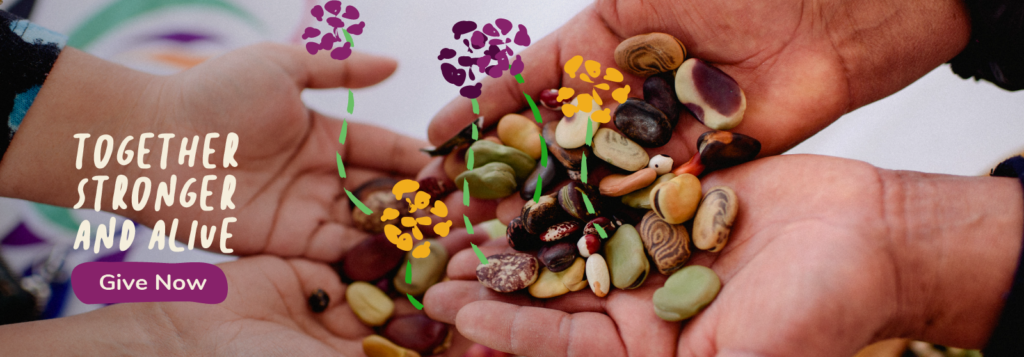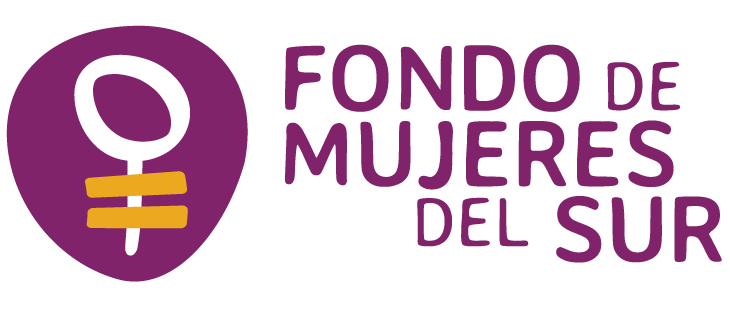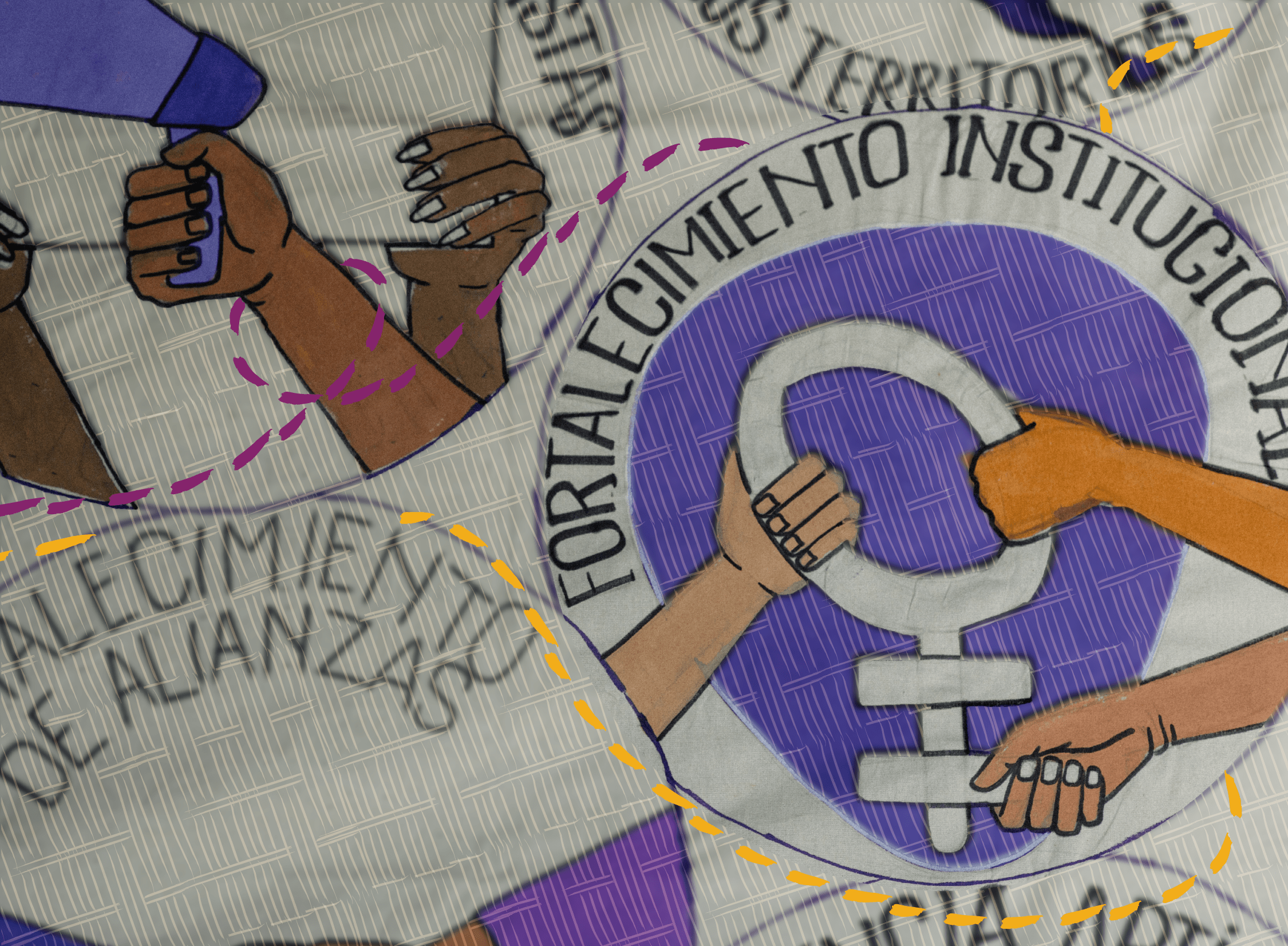Allison and Kelly studied far from Melo, Cerro Largo, where they were born. A few years ago upon graduating they returned to work there and they reconnected with their city in a new way: they wanted to create networks with others to build a community free from violence. Learn about the path they took and how they managed to establish a network for others and for themselves.
This article was written by Lucía Pérez, edited by Eloísa Oliva and translated into English by Christina Hamilton.
Cerro Largo is one of the departments with the highest rates of gender-based violence in the interior of Uruguay. Since 2020, reports of violence have increased steadily: 596 reports were registered in that year, by 2023 the number had risen to 751.
Allison and Kelly are sisters and they live in Melo which is the main city of the department. A few years ago they returned to their place of origin after finishing their studies in Montevideo, the capital of the country. Allison had graduated as a psychologist and Kelly as a lawyer.
They knew it was not going to be easy to return; their time away had seen them grow and it had given them a different perspective on things. “We were getting to know the town again. We had an idea of what it used to be like, but it wasn’t the same any more. When we left, we saw it through the eyes of young ladies, and it didn’t challenge us in the same way it does now,” they say.
They had always understood that the inequalities that women experienced were unfair, but this time it was different. In that process of returning and readapting, with the feminist lens already established in their perspective, the need arose to do something and not stay on the sidelines. To get started with what they had, with their tools. And so, they started looking for networks and support, but they didn’t find much, until they came across the Intertwined call for proposals.
Intertwined was an initiative that Fondo de Mujeres del Sur (FMS) implemented within the framework of the priority area called Eradication of Violence and Discrimination, to strengthen organisations that work on the front line with situations of gender-based violence. From 2021 to 2023, FMS supported collectives and groups in the departments of Artigas, Cerro Largo, Rivera and Tacuarembó, particularly in areas with limited support networks and difficult access to state services1.
For Allison and Kelly, the open call for proposals was a catalyst: they put together a proposal along with their mother and other activists they knew from marches and other activities, and they founded a collective. “We were not organised,” they say, “it was not as though we shared activities or had regular meetings or anything. We did not even have a name.”
They gave the collective the name they still use today making reference to the resilience of women: Mujeres Resilientes. “We believed that what united us all in the group was precisely that, resilience, the power to change situations we had experienced or still experience daily. The name itself already conveyed what we wanted: to make a change in our town,” they say.
The initiatives they implemented with the grant from Intertwined meant significant growth for them. “We made great progress, as a collective, and also each woman in her own life. We made progress with regards to how we worked, our approach and also how we could sit down to talk with women and let the conversation flow. “It hadn’t happened before because we didn’t have the tools,” they add.
All the same, the work was not easy. The activities they organised did not always have the responses they expected. It was difficult for them to articulate with public and private entities. The persistence, tenacity and activity of the organisation reduced the obstacles. They began to position themselves and become recognised as key agents in issues related to violence.
“Afterwards it happened more gradually. The media sought us out, they asked us what we were going to do. Then they ended up accepting, with a ‘well, the girls are taking care of it’ attitude. We had very firm ideas about what we were doing, and I think that helped us overcome barriers and resistance. In the end, they saw that we were serious about our work,” they say.
Kelly and Allison feel that Intertwined was an opportunity for Mujeres Resilientes, and at the same time, it was a means for their consolidation and legitimisation: “It gave us credit, that power to say ‘we are not just crazy women on the loose, this is work, there are solid institutions backing us.’ We were able to be recognised that way, it opened many doors for us.”
Today, Mujeres Resilientes is a key player, a legitimate and leading organisation in Cerro Largo, and even in other neighbouring departments. The ties generated through the initiative consolidated networks with other organisations and activists, which have been maintained, nourished and strengthened.
“We got to work directly with other organisations, we coordinated activities, we took the photo exhibition called Tu silencio nos importa (meaning your silence matters to us) to different locations, an exhibition that we organised within the framework of our project. Our colleagues from San Gregorio de Polanco (Tacuarembó) had some questions about some complicated issues and with Kelly’s legal knowledge we were able to give them initial advice. We are also in contact with another of the grantee organisations to coordinate activities when they come to Cerro Largo,” says Allison.
“A little nook of support and assistance from which to think ahead together”
The women in Cerro Largo find the group to be a reliable and safe voice when needing help. At the same time, for the members themselves, the group was set up as a place from which to think collectively and look for strategies for action and resistance. “When the group started, I was very concerned about the issue of violence because I was going through a difficult situation. They were my support,” says a member of Mujeres Resilientes.
“It is very easy to view violence from a theoretical point of view, but when you experience it personally, it is different. Having gone through that myself helped me to put myself in the other women’s shoes, to become part of their support network and for them to become part of mine too,” she adds.
For Allison and Kelly, the group is a network of support and assistance. “When something happens, any challenge that we face, we go to each other, because we need to know what the other has to say. Or if something happens in Cerro Largo, something that isn’t necessarily related to us, we still automatically check with the other girls to see if there is something we can do. Can Mujeres Resilientes do something?’” Kelly adds.
Providing a network and having a network: to build lives free from violence we need both!
The stories shared show what community networks of women are capable of, what they do, what it means to have a way out of isolation and to be able to begin to think about a shared future with others.
Strengthening these strategies is the way we choose to build lives free from violence. With your donation, you can strengthen these networks so that more organisations can continue with their work. Join the campaign to strengthen the networks that keep us Together, Stronger and Alive!!

asdasas
- Intertwined is an initiative that we implemented in partnership with FLACSO and Asociación Civil El Paso, and with support from the European Union. The project sought to strengthen organisations that work on the front line with situations of gender-based violence in the departments of Artigas, Cerro Largo, Tacuarembó and Rivera in Uruguay. ↩︎

